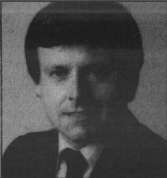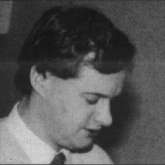
The Bubble Bursts
Imagine is dead — long live imagination.
After months of rumours and counter-rumours, the lively,
publicity-seeking Liverpool software company has collapsed owing half a million
pounds to its bank and creditors.
The company founded by Mark Butler and David Lawson, who
originally split away from Bug-Byte, has lasted a little over a year, having
attracted enormous news coverage from all the media including television.
Shortly before the collapse, Imagine was claiming to be worth in the region of
£30 million.
Discord
But behind the facade of software bustle, money and fast cars there has been
a long history of internal discord. The earliest rumours of Imagine’s
instability started before Christmas when a large amount of their massive
advertising bills remained unpaid. The ads had been booked by Imagine’s agency,
Studio Sting and an estimated amount of over £50,000 of advertising
was unpaid when Studio Sting went into liquidation. The agency’s proprietor was
Stephen Blower, who was also a shareholder in Imagine. Blower became a
victim, according to close witnesses to the Imagine in-fighting.
Another member of Imagine’s staff to fall foul of the founding fathers was
Alan Maton, who has also been at Bug-Byte. He hadn’t been with Imagine
for very long when he became unwillingly involved in a somewhat messy situation
which was the creation of another company intended as a hidden offshoot of
Imagine. When Alan was offered a more suitable partnership and the chance to
run his own affairs away from the fog of the Butler/Lawson administration, he
took it and Software Projects was formed. For months afterwards Maton
was forced to retreat behind a legal shield as all manner of threats and writs
were hurled in his direction by the apparently incensed Dave Lawson acting in
Imagine’s ‘best interests’. Maton was accused of setting up a rival software
company with secret inside knowledge of Imagine’s business dealings.

When Colin Stokes, sales manager for Imagine, left the company and
went to work for Alan Maton’s Software Projects, he was faced with the same
barrage of invective, both verbal and legal, with Imagine publishing in their
Newsletter a whole chunk transcribed, it is claimed, from telephone
conversations between Colin and Imagine’s competitors in the business. Colin had
come under the heading of ‘unreliable’ in the Butler/Lawson cannon and so his
office phones had been bugged.
Mounting Debts
Imagine had over expanded. It was booking its own ads in the magazines and not
paying for them. Debts were mounting with tape duplication firms remaining
unpaid. A few weeks ago, being pressed for payment, Imagine sent out a
duplicated letter to creditors saying that they were expecting to receive
£250,000 within 21 days and would settle all accounts at that time. The
deadline came and went.
Sale of Titles
Then the news was announced that Imagine had concluded a deal with
London-based Beau Jolly to sell the marketing rights of all their
current titles. Beau Jolly’s Managing Director, Colin Ashby, told CRASH, ‘To be
honest, I’m not very happy with the deal. We’re still waiting for the master
tape of PC Bill, and I’m not convinced we’ve got everything we agreed to.’ He
went on to explain, ‘We weren’t paying over money just for old stock. The idea
was to invest in the new games as well, but I think something’s gone wrong.’
The news of the sale alarmed many creditors, CRASH included. It is
impossible to get money from a company without assets, and hadn’t it just sold
the assets? It is a criminal offence to sell assets of a company which is
insolvent. CRASH put this to Colin Ashby. He said, ‘What a revelation. I hadn’t
thought of that.’
The new games Ashby was referring to are the ‘mega-games’ Psyclapse
and Bandersnatch. He told us, ‘I’ve been trying to get Lawson, Butler or
Heatherington for weeks because we thought we were doing the new games as well
in this deal. But I can’t get hold of them.’
No wonder, Messrs Butler, Lawson and Heatherington were not in the country —
at least, according to Bruce Everiss, Operations Controller of Imagine, David
Lawson and Ian Heatherington were in San Francisco trying to raise more
money.
The Collapse
On the 28th June the CRASH offices heard that Personal Computer Games
had issued a writ against Imagine for their debts. A call to Imagine was fobbed
off with the comment by Dave Leon, financial controller, not to pay attention
to silly rumours. When pressed he did admit that a writ had been served. We
then called Bruce Everiss and the confusion began to clear. When asked what was
happening at Imagine Bruce replied shortly, ‘The company is up shit street.
There has been no proper financial control. Not even a VAT return has been
done.’
Responsibility for Imagine’s financial affairs belongs to Ian Heatherington,
who together with Butler and Lawson form the Imagine triumvirate. According to
Bruce Everiss, when Heatherington saw the state he had allowed things to reach,
he formed a personal survival plan together with Dave Lawson. The idea was to
form a new company and gradually transfer the assets of Imagine into it. This
would normally be subject to legal scrutiny by any creditors, but according to
Everiss they had the best lawyers money could buy and the whole is water
tight.

The new company is called Finchspeed and its directors are Mark
Butler, David Lawson and Ian Heatherington. Finchspeed is expected to take
about 20 staff from Imagine, the minimum needed to produce the mega-games which
Colin Ashby thought Beau Jolly would be marketing.
The future of Imagine was in doubt by the time the PCG writ landed on them.
With all the assets stripped and with debts of half a million pounds, Bruce
Everiss was left to find jobs for 60 people. ‘It makes me sick,’ he said to
CRASH, ‘to think that the people who have worked so hard to make the wealth of
Imagine have been left high and dry while the directors of the company have
stripped it bare and got away scot free. They did everything to line their own
pockets.’
So will we see the mega-games? A member of the advertisement department at
Personal Computer Games has told us that should anyone having anything at all
to do with Finchspeed or any of its directors approach them for advertising
space they would be told where to go. Bruce Everiss is more pragmatic about
Finchspeed’s chances. ‘They have a lot of money,’ he says, ‘if they go round
paying in advance for their ads, who will refuse them?’
Trashed by Trashman
In what may prove yet to be the most dangerous precedent ever
set by a member of the software community, New Generation launched its
new series of The Complete Machine Code Tutor for the Spectrum (48K),
CBM 64, BBC and Atari computers. This was done in quite a clever way, since
the computer press are not noted for dashing out to launches of educational
software New Gen arranged a competition for the various editors of computer
magazines to battle over a game of Trashman — the winning editor to take
a weekend in Paris for two. This fiendish ploy was obviously designed to get
an ear for the new program as well as setting editor at editor’s throat and
starting an internecine war between the magazines!
In the end, after a lot of nail biting, the winner was Peter Green,
editor of Computing Today who scored 9187 points. He beat Chris
Anderson, editor of Personal Computer Games by only 45 points.
Chris had played in the first round at the same time as the erstwhile CRASH
editor did his bit. Tony Heatherington of Personal Computer
World came third with 3138.
CRASH was bravely represented by none other than Roger Kean,
who despite the disadvantage of a damaged joystick at his regular morning
practice, managed to come somewhere after that with two thousand and...
something!
The holiday was handed over accompanied by a suitable round of booing from
the other unimpressed magazines.
Machine Code Tutor
This is New Generation’s first excursion into the
‘educational’ software market. It is aimed to give the BASIC programmer a step
by step guide to learning machine code programming. The Spectrum version
contains two cassettes with over 100K of data. 33 lessons follow exercises
together with a comprehensive booklet. New Generation claim that the user may
experiment without fear of crashing the program and that the high standard
assembler in the system ensures fast error trapping and correction. The
Machine Code Tutor retails at £14.95 and will be subjected to
a CRASH review soon.
Jump Challenge
Eddie Kidd, the motor-cycle stunt ace, is soon to be a computer
game! Software producers Martech are launching a game called Jump
Challenge on the Spectrum (48K) and the CBM 64 this month. Eddie, whose
astounding bike jump of 190 feet is a world record, has been closely involved
with the game’s programmers for several months, claim Martech. They say
the result is a unique, highly realistic game which challenges the player to
try and match Eddie Kidd’s skill, timing, control and sheer courage in
leaping over increasingly difficult and dangerous obstacles. Well, we’ll
soon see.
In the meantime, if the real things appeal as much as the game, Martech say
that Eddie Kidd will be making personal appearances on the Martech stand at
major computer fairs over the next few months.
Cheaper Software
The British software industry has been a little alarmed by
the spate of cheap software around recently. Warwick Leisure’s Pulsonic range
at £2.99 and the Mastertronic programs at only £1.99 have obviously
given cause for alarm. Despite general public calls for lower prices, many
software houses feel that it is no longer economically feasible to produce
really complicated games at such low prices.
Nevertheless a number of well-known companies are preparing to do just that
and lower prices. Mike Cohen of Lothlorien says that the market is
changing, opening up so that it is possible to sell a particular type of game
at around the £3 mark without seriously affecting the high quality game
for which Britain has become known at the higher prices. Lothlorien are
certainly considering a range of much lower priced games, and a cartel of
other software houses are expected to announce low-priced ranges of games
before much longer.
Software house C.C.S. have also gone onto the lower price range,
kicking off with two games in the new ‘Charlie Charlie Sugar’ range. Priced
at £2.99 both games are for the 48K Spectrum. Dix Mille is
described as a traditional French dice game which can be enjoyed by all age
groups. Whodunnit is an investigative game for up to four players and
is a computer version of the famous board game Cluedo. Whodunnit looks
like one we have already seen released by a company called Placet, but the new
version has been rewritten.
C.C.S. say that the new range is designed to encourage impulse buying and
is accordingly priced within the average teenager’s pocket money allowance. A
lot of software houses have obviously noted Mastertronic’s success when
placed next to the till a quick impulse buys out of the change from a main
game purchase. The question remains — at half the price, on average, of games
which have been carefully developed, are these cheapies really worth the
money? We’ll be taking a look at the Charlie Charlie Sugars next issue.
Anti-copycat Cartel
Software houses PSS, CRL, Anirog, Sliversoft, Interceptor,
Microdeal and Visions have joined forces in an attempt to stamp out
home copying. The action being taken is the threatened withdrawal of all
advertising support from any journal carrying advertisements for tape or disc
copiers. Gary Mays of PSS said, ‘There shouldn’t be the need for such
devices. We offer a replacement tape or disc should either fail to load, and I
would have thought this was sufficient.’
Marlboro Clubman
On a somewhat lighter note PSS have a hardware success
on their hands it seems. It comes in the form of 23 year old Kevin Bowes
and his motor cycle. Kevin, a printer by trade, started racing motorbikes as a
hobby. He progressed well against his local Coventry rivals and came to the
attention of PSS who pledged their sponsorship support for 1984.
It’s been repaid well. After an early victory in a pre-championship warm up
race at Snetterton during March, Kevin has gone from strength to strength,
qualifying for the Marlboro Clubman’s Championship, where he is currently lying
5th in the overall Championship table.

The Moth of Magra
After an extensive advertising campaign
over Christmas period and then endless delays in its release, Carnell’s
Wrath of Magra adventure seems to have bitten the dust owing to the fact
that Carnell Software has gone into liquidation. At the time of writing, the
company has called a meeting of creditors to sort the situation out, but it
seems unlikely that Carnell will survive in any recognisable form.
The fate of the Wrath of Magra is also in some
doubt. There were rumours that the program had been partly financed by the
software distributors Websters, but phone calls to Websters resulted in
blanks being drawn — they had never heard of it. It is possible that another
software house may pick the program up for marketing. Advance reports from
Derek Brewster on the game suggest that despite its mammoth length, it
contains serious drawbacks including up to 10 second delays in responding to
input. So for the time being it looks as though Magra is in mothballs — maybe
forever.
The Cost of Repairs
It seems to be harder to get your Spectrum repaired these
days, what with reports of Sinclair themselves taking up to six months in some
cases. As a result repair services have become more common. Thomas Walker
& Son Ltd., are one such, but in this young business Walkers are hardly
new. Established in 1838, the Birmingham-based company has been [an] innovator
in the field of machine instrumentation. They hit the headlines in 1980 when
they launched the world’s smallest and cheapest satellite navigator to the
yacht leisure industry.
The Sat Navs, which are a combination of receiver, computer, keyboard
and display PCBs, have given the company considerable experience with the Z80
CPU which is the basis of the Spectrum. It seemed natural to move into home
computer repairs. Their repair service now includes the Atari and Commodore
computers as well as the Sinclair machines.
The services offered by Walkers Computer Service and Repairs provide
for one-off repairs and quotations direct to the customer and as a support to
computer dealers who require back-up to their sales.
K-Boards
Professional keyboards for the Spectrum
have become quite a business in recent months. Now Kelwood Computer
Cases have launched their K-Board. Unlike most other fit-on
keyboards, the Kelwood K-Board is not a complete housing for the Spectrum but
an assembly which sits on top of the Spectrum’s keyboard and replaces the
membrane circuit. The new keyboard fits where the old one was with ribbon
connectors replacing the existing ones. The keys are foil printed in red and
gold and are claimed to have a fast switching time, with smooth action and a
travel of less than 1mm. The keys are shrouded by a plastic moulding on top of
which sits the original Spectrum key template.
American Software
Cheetah Soft (Bat Attack and Conquest)
has signed a deal to produce Imagic Software for the Spectrum. Imagic
has been producing software in the United States for some time. The first two
titles are Moon Sweeper and Dragon Fire and should be available
on cassette soon priced at £7.95.
Cheaper Interface
Cambridge Computing have recently reduced the price of
their Spectrum Programmable Joystick Interface from £34.90 to £29.95
which includes the two independent fire button joystick. The interface alone is
reduced from £27.90 to £22.95.
At the same time the software used to program the joystick interface has
been extensively rewritten, say Cambridge. It is now fully microdrive
compatible and additionally can record the key combinations for up to 250
separate games (48K version).
New Representation
With Full Throttle, Micromega look set for
another 3D hit, but Neil Hooper says it may be one of the last 3D games
they do. There is another on the stocks, a cockpit view game with a sequence of
events such as landing on a planet, walking in space, getting into a crawler,
shooting aliens, returning to the ship and blasting off, but that is likely to
be the last strictly 3D game Micromega produces. He says, ‘We’re
looking at a new representation for video games. There are lots of ideas
floating about here at the moment. It’s all quite exciting!’
Spanish Action
In last month’s News Input we reported on some games
from a Spanish software house. Some of their Spectrum programs have already
been reviewed by us and would have appeared in this issue, but we have been
asked to hold them back. The games and all their documentation were in Spanish,
but an English software house (undisclosed at this time) has entered into a
marketing deal with the Spanish company, Ventamatic, to market the games
here in Britain. At present new English inlays and English text graphics are
being designed. So we’ll be reviewing them as soon as they are ready.





